Part 1: Evidence and Reflection of Learning in EDCI 339
Looking back on my the activities and experiences I had during this course, there have been multiple instances where I’ve learned something new about open learning. Going through the activities that were required throughout the course, I hope I can demonstrate how precisely they have shaped my learning.
Blog Posts & Comments
During the course, the most common or significant regular activity was writing blog posts on weekly topics. With my first blog post regarding privacy among online platforms, including open learning platforms such as WordPress and Brightspace or even Health Information contexts, I acknowledged the importance of all users to question the extent of privacy we have while using these platforms/services.
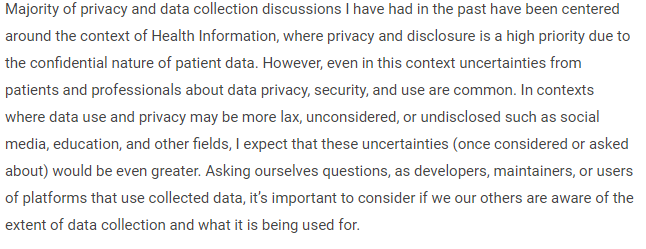
In consideration of what privacy may mean or can be enforced, I came to the conclusion that it is important to be vigilant and inquisitive of data collection from all stakeholders. I believe this help reinforces my beliefs and learning that privacy requires a proportional culture that is receptive and aware of privacy measures.
Another related activity to blogs is the commenting and responding to comments that I and my fellow classmates underwent. Tied to the first blog is the comment section, where my instructor Ryan asked a question about how I may be concerned for my privacy as per privacy policies in B.C. or post-use of platforms.
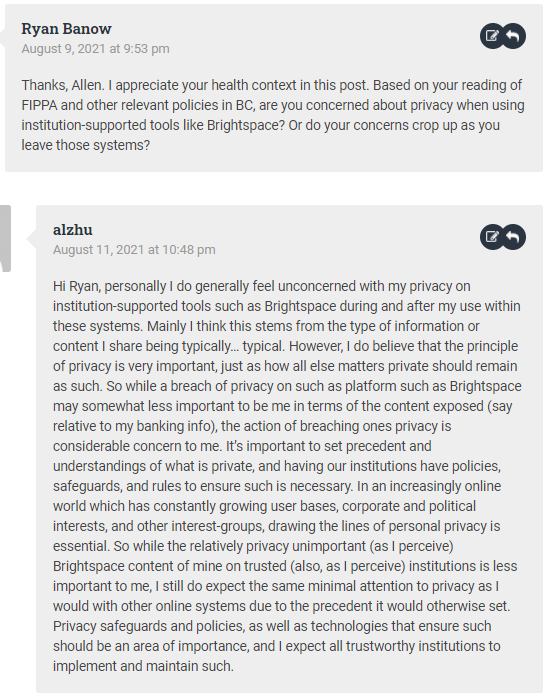
Again, I reflect on the nature of privacy when using open learning platforms, and how, at least in this context, the lack of sensitive information being used lowers my concern. However, on reflection of FIPPA, privacy, and privacy in an technologically online world, I do come to terms that Internet privacy is an important personal and trust issue.
I believe my first blog post and comments reflect to an extent doing some research into and critically reflect upon emerging and future educational technologies. Understanding how policies like FIPPA ensure privacy, as well as how and what information online and open learning platforms may collect is important to being privacy aware in an increasingly online world.
In my second blog, where I cover the topic of history and context of distributed & open learning, I reflect on different kinds of open learning environments/methods. Reading over and reflecting on MOOC (Massively Online Open Courses) in relation to MMORPGs made me reconsider the potential for open learning (John Hopkins University Press, 2015).
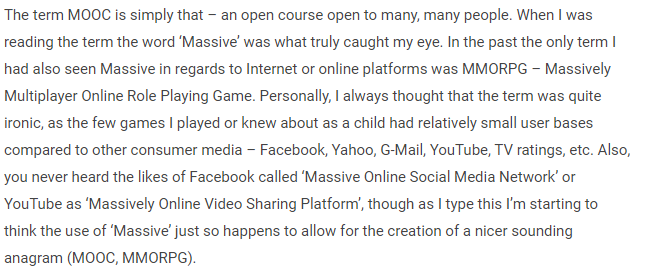
By drawing such a personal comparison, I reconsidered how MOOCs and its variants could reach out to more learners, while still somehow offering a sense of company. The idea of working within a network was a concept that came to me through this, and helped me better understand potential benefits of open learning, as well as conceptualize different modalities of open learning.
The third and fourth blogs helped me reconsider my educational experience, as well as think more so on equity of education and how open learning can support such. The topic of “disposable” assignments was what first struck out to me from the literature. Understanding how open learning can provide “renewable” assignments with greater learning applications helped me determine one of what I perceive to be the strongest aspects of open learning.

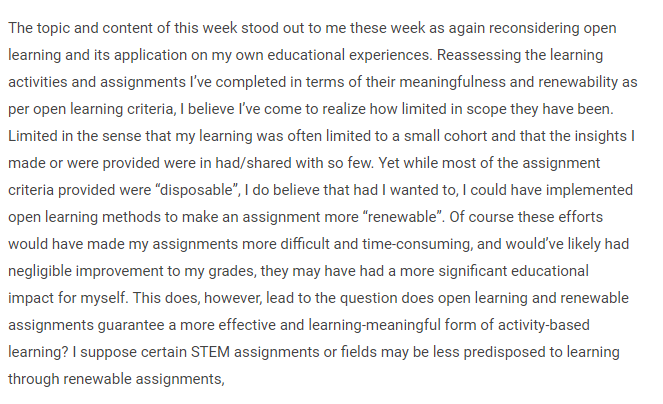
This contributed to my development of being able to articulate part of open learning as a more impactful form of learning than other traditional methods. In effect, this also ties to my understanding of human-centered benefits of open learning (meaningfulness) and engaging with the literature in understanding some open learning concepts.
Another aspect covered is equity and access, which I believe open learning can help provide relative to that of our traditional and more common forms of education. Writing on how our current education system limits, while open learning can help provide those without the means access to education helped me reconsider if our society that professes egalitarian and fair values still stratifies unjustly (or justly) how educational resources may be accessed. Open learning, however, offers the opportunities otherwise outstanding for outsiders due to socio-economic or other reasons.
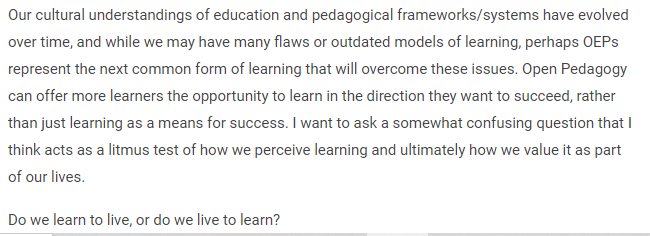
This contributed to my understanding of open learnings potential for equitable and accessible access of learning materials. It is important for us to form and set ideals for equitable and progress-focused learning (as a society, as a species).
Concluding Remarks
Concluding this open learning course and the first chapter of my post-secondary experience is an oddly fitting choice. Being able to retrospect and how my learning experiences have been possibly limited was enlightening. While I do believe that some of my learning and comprehension also formed from group work and Zoom calls, I do also believe that the best of it can be seen from my blog posts. Open learning and related concepts already have an important part in our education systems now, but I can also say now that I am informed now of it such that I am now myself ‘open’ to it too! Looking for open education and resources, as well as re-evaluating how I can make my own future learning experiences (as learner, or casually a teacher for personal matters or in explaining Health Information matters) more open is something that I am starting to think of. Overall, this EDCI course has been eye-opening and perspective widening for myself.
References:
Johns, Hopkins University Press. Teaching Online : A Guide to Theory, Research, and Practice, Johns Hopkins University Press, 2015. ProQuest Ebook Central, https://ebookcentral-proquest-com.ezproxy.library.uvic.ca/lib/uvic/detail.action?docID=3318874.
Part 2: Revised and Showcase Blog
Original:
Updated:
Reasons for Change:
I wanted to update and clarify my argument and points made about equity and stratified education. Furthermore, I provide a more personal and specific example of a “disposable” assignment that helped shaped my thinking of how open learning could have benefited my past education experiences. Also, I think my initial post was a little disorganized and I believe the new heading changes made help the readability of the post.
Leave a Reply